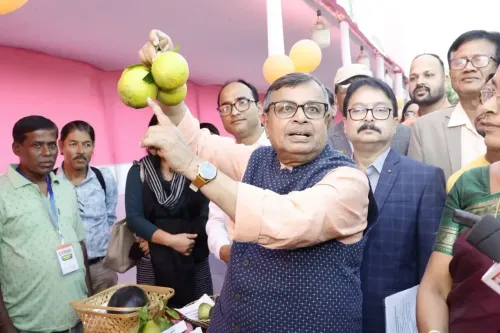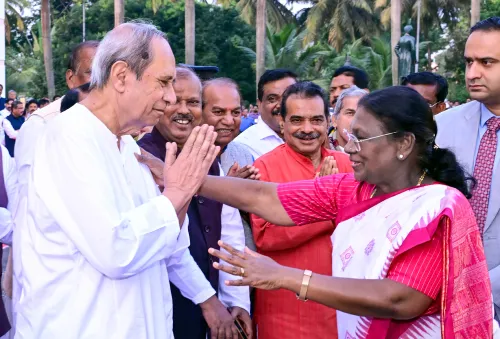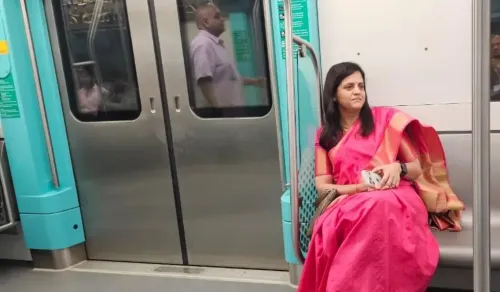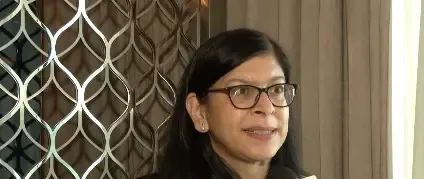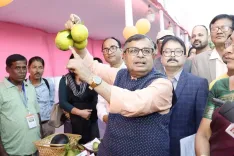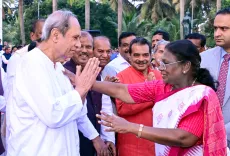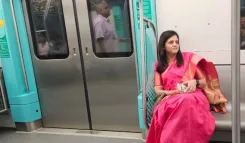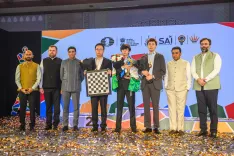What Are Former CJI B.R. Gavai's Reflections on Justice and Politics?
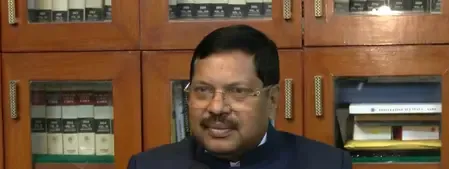
Synopsis
Key Takeaways
- Justice B.R. Gavai reflects on a fulfilling tenure as CJI.
- He addresses challenges from social media and AI.
- Emphasizes the importance of maintaining the integrity of the judiciary.
- Advocates for social service, particularly for tribal communities.
- Stresses that India's Constitution remains secure against political threats.
New Delhi, Nov 27 (NationPress) The former Chief Justice of India, B.R. Gavai, reflected on his time in the nation's highest judicial office, expressing fulfillment with his accomplishments while confronting modern challenges, including social media hostility, misuse of AI, and claims of political meddling in the judiciary.
In an extensive interview with IANS following his retirement, Justice Gavai discussed constitutional principles, the issue of 'bulldozer justice', the need for improved representation of women in the judiciary, and his aspirations for social service. He firmly emphasized that courts should not be platforms for political skirmishes and asserted the enduring strength of India's Constitution.
Excerpts:
IANS: How do you evaluate your tenure as CJI, and were there any objectives you couldn't achieve?
Gavai: I am content with my time as CJI. There was nothing I wished to accomplish that I couldn't.
IANS: How do you respond to accusations on social media, and what risks do they pose to the judiciary?
Gavai: All branches of governance, including the judiciary, endure the challenges posed by social media. While technology is beneficial, its misuse is rampant. It's essential for all parties to collaborate, with Parliament taking the lead in enacting laws to mitigate these issues.
IANS: The misuse of AI is increasing. Is this problematic? An AI-generated video of you circulated online, but you chose to forgive it.
Gavai: Technology brings advantages, yet it also has significant drawbacks. Legislative measures are necessary to tackle these threats.
IANS: You mentioned your intent to engage in social service post-retirement. What are your plans?
Gavai: I aim to support the tribal communities in the Belghat region, with whom I have a long-standing connection stemming from my father's political campaigns. I aspire to dedicate time to social service.
IANS: There are rumors of you following your father's political legacy. Are you considering a political career?
Gavai: There are currently no plans for a political career. I haven't made any decisions regarding my future, and I intend to enjoy some well-deserved rest for the time being.
IANS: Regarding your post-retirement role, is it inappropriate to take on any position?
Gavai: I never claimed that taking on a role post-retirement is wrong. It's a personal choice. After years in the judiciary, if someone believes their experience can benefit an institution, there's nothing wrong with that. Upon my appointment as a Supreme Court judge in 2019 and later as CJI in 2025, I consistently stated my intention not to accept any government position post-retirement.
IANS: You issued a landmark ruling on 'bulldozer justice', yet some states still neglect its implementation. Shouldn't stricter measures be taken?
Gavai: Implementation is key. The judgment outlined that anyone disregarding it would face strict consequences. Officers who violate this could be held in contempt. We provided citizens the opportunity to approach the high court for grievances. Even during my tenure, contempt petitions were filed, but we couldn't address them due to time limitations.
IANS: We celebrated Constitution Day recently. What are your thoughts on Baba Saheb Ambedkar's vision and constitutional values?
Gavai: Coming from a modest background, my father was a firm believer in Ambedkar. My achievements are attributed to Baba Saheb's teachings and the Indian Constitution. He envisioned not just political justice but also social and economic justice. He believed that democracy would prosper only when political democracy was paired with social and economic democracy. Therefore, our three institutions (legislature, executive, and judiciary) need to collaborate. Justice must be accessible to every citizen affordably. This is my homage to Baba Saheb.
IANS: Is the Constitution established by Ambedkar under threat?
Gavai: No, I don't think so.
IANS: Some political figures assert that the Constitution is under threat. What are your thoughts?
Gavai: I don't believe the Constitution is in jeopardy. The 1973 Kesavananda Bharati ruling clearly indicates that Parliament cannot alter the 'basic structure' of the Constitution. The Constitution cannot be amended, and this applies to all institutions. If someone perceives a threat to the Constitution, I believe it is unjustified.
IANS: During your tenure, you delivered historic decisions, yet some people on social media label you as anti-Sanatan. How do you respond to the trolling?
Gavai: I do not engage with social media. I never made any derogatory comments about Lord Vishnu; those statements were misrepresented. A judge should base decisions on facts and evidence, not social media sentiments.
IANS: Is there governmental interference in the judiciary, particularly concerning judge transfers?
Gavai: No, this notion is incorrect. The government does not interfere with the judiciary. However, when the Collegium makes decisions, various factors are considered, including feedback from the executive, Intelligence Bureau, and Law Ministry. The opinions of the Chief Minister and Governor are also taken into account. Nevertheless, this doesn't imply that the Collegium operates under pressure.
IANS: What is your take on the Justice Yashwant Verma case?
Gavai: At the time of that occurrence, I was in Kenya attending a conference with Justice Surya Kant (now CJI). The inquiry committee formed by the Speaker of Parliament, led by a Supreme Court judge, is ongoing. Therefore, it's inappropriate for me to comment on this matter.
IANS: Current CJI Surya Kant mentioned he can't even take a walk due to the severe pollution in Delhi. Is judicial intervention the answer to this issue?
Gavai: No. The judiciary can issue orders, but implementation is the executive's responsibility. I've observed that the apparatus for managing this issue is not adequately equipped. The pollution control boards in Delhi and other states still have numerous vacancies. Without staffing, how can orders be enacted?
IANS: The judiciary has frequently been dragged into politics. Recently, Leader of the Opposition Rahul Gandhi raised the issue of 'Vote Theft' but did not pursue legal action. Do you believe the judiciary is unnecessarily involved in political matters?
Gavai: I have consistently maintained that courts should not serve as battlegrounds for political disputes. Political contests must be resolved through the electorate, not within the judiciary.
There have been multiple instances where cases were filed against politicians. I have publicly asserted that neither central nor state investigative agencies should be exploited for political gain. During my tenure, I handled two cases involving senior Karnataka politicians facing Enforcement Directorate scrutiny, as well as a case concerning a Member of Parliament from the ruling party.
In both instances, I made it clear that the investigative apparatus cannot be used to settle political scores. I granted relief in both cases because political disputes should be determined by the people, not the courts.
IANS: What are your thoughts on Prime Minister Narendra Modi's visit to former CJI D.Y. Chandrachud's residence?
Gavai: I prefer not to comment on specific incidents. The executive, legislature, and judiciary — these three branches work for the citizens of our nation to deliver justice and resolve their issues. These entities are independent, operating within their respective domains while fulfilling their constitutional responsibilities. Therefore, meetings among them are not problematic.
IANS: Do you think judges should be subject to criticism?
Gavai: Critiques of judicial decisions are always acceptable. Judges are human and may err. However, personal attacks and trolling against judges are inappropriate and unjustified.
IANS: It appears that women are not adequately represented in the judiciary. What is your perspective on this?
Gavai: Women's representation in the judiciary must improve. Recently published research indicates that during my tenure, there was significant progress in the appointment of women to the high courts. Despite having two female lawyers working in the Supreme Court, their names were recommended for the Allahabad High Court, where they are now serving. The number of women lawyers is also on the rise.
IANS: What message do you have for enhancing the judiciary?
Gavai: What message can I provide? The judges of the high court and the Supreme Court, as well as the former judges, are all knowledgeable, and everyone understands how to fulfill their duties for the betterment of the institution and the country.
IANS: What is your take on Maoism?
Gavai: I am pleased to see that Maoism is diminishing in many regions today. Gadchiroli in Maharashtra was once a significant hub, but it has considerably declined.

